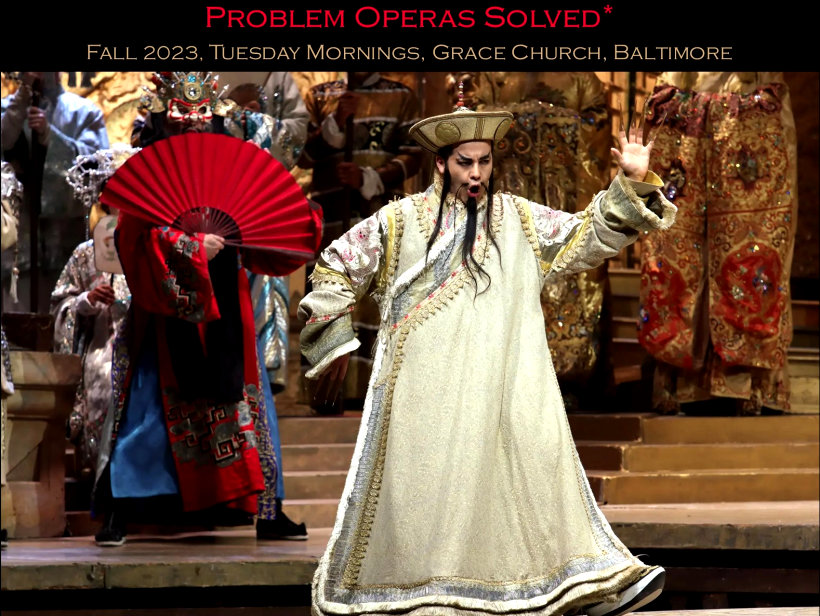| Handout (flat) Handout (folded) Class Script | Return to Index |
As usual, a mixed bag. The original 1982 Met production by Jean-Pierre Ponnelle is available complete
on YouTube with titles, though it is rather grainy and grey. A more recent revival from the Met is also available
complete; it is much sharper but does not have titles. I also include a link to a complete production from La Scala,
directed by Luc Bondy; it is by no means HD, but it does have titles.
For the other two productions (Dieter Dorn in Munich and Robert Carsen in both Madrid and Rome), we have to make do with trailers, interviews, and a scene from the Dorn that we did not get to see.* I also include links to reviews of each of these productions by a blog writer whose opinions I generally trust. The only other thing I include is the end of Act II in the "madhouse" production by Damiano Michieletto in Vienna, which I may or may not have had time for in class.
*The ending of the Dorn production merits a couple more notes:
1. Dorn ends the performance with the 12-minute ballet music that Mozart wrote for insertion in
the opera elsewhere; you just see the beginning of this in the clip as the characters come back onstage, but in the
performance the entire orchestra pit rises slowly to stage level, and it is the players rather than the singers who take
the first bow.
2. It includes the scenery-chewing aria "D'Oreste, d'Ajace" for Electra, in which
she drops her relatively lyric role as the "other woman" and reverts to type as the demonically possessed heroine of the
Euripides play or the Strauss opera; I include a little gallery of various performances of this astounding aria. If you
watch just one of these, make it Nicole Chevalier; you won't regret it! rb.
| PONNELLE, NEW YORK 1982 | |||
| Original 1982 production |
Complete
(as played in class) — Idomeneo aria "Fuor del mar" — Chorus "Placido è il mar" |
||
| 2017 revival | Complete (sharper, but no titles) | ||
| BONDY, MILAN 2005 | |||
| Complete opera | Full opera (with rather obtrusive titles) | ||
| DORN, MUNICH 2008 | |||
| Various selections |
Trailer Sacrifice scene to the end (not played, but quite powerful) |
||
| Review | From blog "Opera Ramblings" (John Gilks) | ||
| MICHIELETTO, VIENNA 2013 | |||
| End of Act II | Attack of the sea monster (Richard Croft) | ||
| CARSEN, ROME/MADRID 2019 | |||
| Trailers |
Rome Madrid |
||
| Interviews |
Rome
(with conductor Michele Mariotti) Madrid |
||
| Review | From blog "Opera Ramblings" (John Gilks) | ||
| ELECTRA'S LAST ARIA | |||
| "D'Oreste, d'Ajace" |
Hildegard Behrens
(Met 1982) Emma Bell (Milan 2005) Anja Harteros (Salzburg 2006) Anna Netrebko (Salzburg 2006, in concert) Annette Dasch (Munich 2008) Nicole Chevalier (Salzburg 2019) Hanna-Elisabeth Müller (Munich 2021) |
||















